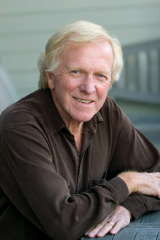Heading into a new year, one thing is certain: No one knows exactly what’s going to happen in our economy. Leading financial institutions have failed, stock markets have crashed and millions of homes are in foreclosure. What’s next?
A recent report on CBS’s 60 Minutes revealed that the market in credit derivatives, the unregulated financial instruments that exorbitantly magnified the collapse of the housing market, had grown from $100 billion to more than—are you ready for this?—$50 trillion. This happened in the eight years following the deregulation of derivatives, or credit default swaps, or collateralized debt obligations—whatever you choose to call them (Warren Buffett labels them “financial weapons of mass destruction”). That figure again: $50 trillion.
As direct and indirect results, Iceland, Pakistan and Hungary are approaching insolvency, as is General Motors; 10 million U.S. homes have mortgages exceeding their worth; unemployment claims are passing recession levels; and retail sales and industrial production have fallen dramatically. More bad news: California faces a budget deficit of $10 billion.
Yet, when I’m out and about—including recent days in New York City and San Francisco—all appears well. Airports, major stores and high-end restaurants are bustling; cars on the freeways still sport the occasional paper license plate; and, here in Marin, homes seem to be changing owners regularly—though prices have dipped a little. So what’s going on?
All I can say for sure is this: Marin County is as good as any place to live out the uncertain times that certainly lie ahead. Let’s count the ways.
First, Obama is president. In Marin, he handily won the state primary and received nearly 80 percent of the local vote in the final election. That should put a bounce in our step. Moreover, with Mark Leno as state senator, Jared Huffman as assemblyman and Lynn Woolsey in Congress, Marin has a solid team of legislative representatives.
More Marin-positive election results: Measures Q, A and E all passed, which means, respectively, the over $1 billion SMART commuter rail line will be built; Mill Valley will have $2 million more each year to educate its nearly 3,000 students; and Corte Madera and Larkspur will break ground on a $20 million police headquarters. Why is this good? According to Nobel Prize–winning economist Paul Krugman: “What we need in these perilous times is more, not less, government spending.”
Considering that, voter approval of California’s $10 billion zero-emissions high-speed train between L.A. and S.F. is another economic victory. More good news: Marin County’s bond rating was recently upgraded to AA+, one of California’s highest. During 2009, keep these items in mind.
At the same time, let’s not forget Marin is a caring, creative and, yes, affluent community. An example is Kentfield’s Don Santa. Not only will his successful Woodlands Market in Kentfield soon be expanding into Belvedere/Tiburon, but he recently lent out his one-of-a-kind mountaintop home for a local fundraiser. Afterward, Santa said it best: “Where else but in Marin will you find in the midst of the worst economic crisis of our times a group getting together and raising $300,000 in one evening, as the Ross Valley Women’s League did for Adopt a Family of Marin?” That’s a productive evening for a nonprofit.
And here’s Bank of Marin President/CEO Russ Colombo’s take on the times: “While no one’s immune from the current economic perils, Marin’s slow-growth approach will now serve us well. We have no new tracts of homes here; therefore, we have very few, if any, sub-prime loans and the foreclosures that often follow.” Colombo, born and raised in Marin, is cautiously optimistic. “Thanks to our bank’s conservative lending policies, we experienced solid growth in 2008,” he says of his institution, which has nearly $1 billion in assets, “and in 2009 we anticipate continued growth, though maybe not as fast.”
Finally, with America’s new president for inspiration let us resolve to volunteer to an even higher degree and be nicer, more congenial, to one another. It could be a difficult, more stressful era—and remember, we are all in this together. As stated above, Marin is as good (and beautiful) as any place on earth to live out the uncertain times that lie ahead. That’s my point of view. What’s yours?
E-mail [email protected].


